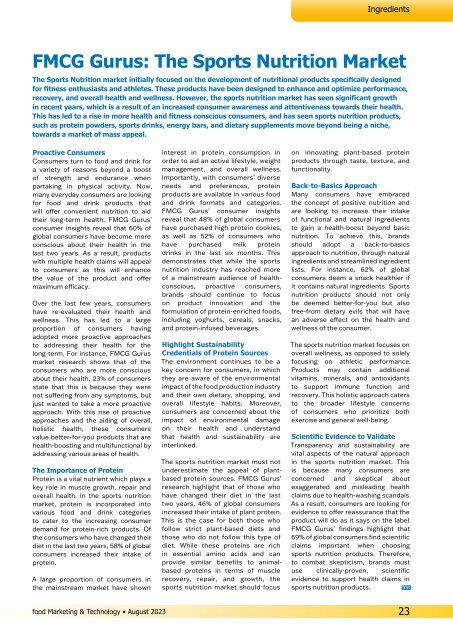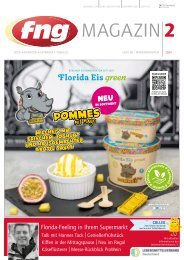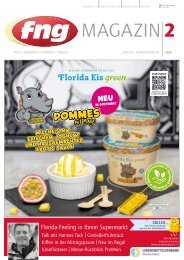food Marketing - Technology 4/2023
food Marketing & Technology is the international magazine for executives and specialists in the food industry.
food Marketing & Technology is the international magazine for executives and specialists in the food industry.
Create successful ePaper yourself
Turn your PDF publications into a flip-book with our unique Google optimized e-Paper software.
Ingredients<br />
FMCG Gurus: The Sports Nutrition Market<br />
The Sports Nutrition market initially focused on the development of nutritional products specifically designed<br />
for fitness enthusiasts and athletes. These products have been designed to enhance and optimize performance,<br />
recovery, and overall health and wellness. However, the sports nutrition market has seen significant growth<br />
in recent years, which is a result of an increased consumer awareness and attentiveness towards their health.<br />
This has led to a rise in more health and fitness conscious consumers, and has seen sports nutrition products,<br />
such as protein powders, sports drinks, energy bars, and dietary supplements move beyond being a niche,<br />
towards a market of mass appeal.<br />
Proactive Consumers<br />
Consumers turn to <strong>food</strong> and drink for<br />
a variety of reasons beyond a boost<br />
of strength and endurance when<br />
partaking in physical activity. Now,<br />
many everyday consumers are looking<br />
for <strong>food</strong> and drink products that<br />
will offer convenient nutrition to aid<br />
their long-term health. FMCG Gurus’<br />
consumer insights reveal that 60% of<br />
global consumers have become more<br />
conscious about their health in the<br />
last two years. As a result, products<br />
with multiple health claims will appeal<br />
to consumers as this will enhance<br />
the value of the product and offer<br />
maximum efficacy.<br />
Over the last few years, consumers<br />
have re-evaluated their health and<br />
wellness. This has led to a large<br />
proportion of consumers having<br />
adopted more proactive approaches<br />
to addressing their health for the<br />
long-term. For instance, FMCG Gurus<br />
market research shows that of the<br />
consumers who are more conscious<br />
about their health, 23% of consumers<br />
state that this is because they were<br />
not suffering from any symptoms, but<br />
just wanted to take a more proactive<br />
approach. With this rise of proactive<br />
approaches and the aiding of overall,<br />
holistic health, these consumers<br />
value better-for-you products that are<br />
health-boosting and multifunctional by<br />
addressing various areas of health.<br />
The Importance of Protein<br />
Protein is a vital nutrient which plays a<br />
key role in muscle growth, repair and<br />
overall health. In the sports nutrition<br />
market, protein is incorporated into<br />
various <strong>food</strong> and drink categories<br />
to cater to the increasing consumer<br />
demand for protein-rich products. Of<br />
the consumers who have changed their<br />
diet in the last two years, 58% of global<br />
consumers increased their intake of<br />
protein.<br />
A large proportion of consumers in<br />
the mainstream market have shown<br />
interest in protein consumption in<br />
order to aid an active lifestyle, weight<br />
management, and overall wellness.<br />
Importantly, with consumers’ diverse<br />
needs and preferences, protein<br />
products are available in various <strong>food</strong><br />
and drink formats and categories.<br />
FMCG Gurus’ consumer insights<br />
reveal that 48% of global consumers<br />
have purchased high protein cookies,<br />
as well as 52% of consumers who<br />
have purchased milk protein<br />
drinks in the last six months. This<br />
demonstrates that while the sports<br />
nutrition industry has reached more<br />
of a mainstream audience of healthconscious,<br />
proactive consumers,<br />
brands should continue to focus<br />
on product innovation and the<br />
formulation of protein-enriched <strong>food</strong>s,<br />
including yoghurts, cereals, snacks,<br />
and protein-infused beverages.<br />
Highlight Sustainability<br />
Credentials of Protein Sources<br />
The environment continues to be a<br />
key concern for consumers, in which<br />
they are aware of the environmental<br />
impact of the <strong>food</strong> production industry<br />
and their own dietary, shopping, and<br />
overall lifestyle habits. Moreover,<br />
consumers are concerned about the<br />
impact of environmental damage<br />
on their health and understand<br />
that health and sustainability are<br />
interlinked.<br />
The sports nutrition market must not<br />
underestimate the appeal of plantbased<br />
protein sources. FMCG Gurus’<br />
research highlight that of those who<br />
have changed their diet in the last<br />
two years, 46% of global consumers<br />
increased their intake of plant protein.<br />
This is the case for both those who<br />
follow strict plant-based diets and<br />
those who do not follow this type of<br />
diet. While these proteins are rich<br />
in essential amino acids and can<br />
provide similar benefits to animalbased<br />
proteins in terms of muscle<br />
recovery, repair, and growth, the<br />
sports nutrition market should focus<br />
on innovating plant-based protein<br />
products through taste, texture, and<br />
functionality.<br />
Back-to-Basics Approach<br />
Many consumers have embraced<br />
the concept of positive nutrition and<br />
are looking to increase their intake<br />
of functional and natural ingredients<br />
to gain a health-boost beyond basic<br />
nutrition. To achieve this, brands<br />
should adopt a back-to-basics<br />
approach to nutrition, through natural<br />
ingredients and streamlined ingredient<br />
lists. For instance, 62% of global<br />
consumers deem a snack healthier if<br />
it contains natural ingredients. Sports<br />
nutrition products should not only<br />
be deemed better-for-you but also<br />
free-from dietary evils that will have<br />
an adverse effect on the health and<br />
wellness of the consumer.<br />
The sports nutrition market focuses on<br />
overall wellness, as opposed to solely<br />
focusing on athletic performance.<br />
Products may contain additional<br />
vitamins, minerals, and antioxidants<br />
to support immune function and<br />
recovery. This holistic approach caters<br />
to the broader lifestyle concerns<br />
of consumers who prioritize both<br />
exercise and general well-being.<br />
Scientific Evidence to Validate<br />
Transparency and sustainability are<br />
vital aspects of the natural approach<br />
in the sports nutrition market. This<br />
is because many consumers are<br />
concerned and skeptical about<br />
exaggerated and misleading health<br />
claims due to health-washing scandals.<br />
As a result, consumers are looking for<br />
evidence to offer reassurance that the<br />
product will do as it says on the label.<br />
FMCG Gurus’ findings highlight that<br />
69% of global consumers find scientific<br />
claims important when choosing<br />
sports nutrition products. Therefore,<br />
to combat skepticism, brands must<br />
use clinically-proven, scientific<br />
evidence to support health claims in<br />
sports nutrition products.<br />
fmt<br />
<strong>food</strong> <strong>Marketing</strong> & <strong>Technology</strong> • August <strong>2023</strong><br />
23


















